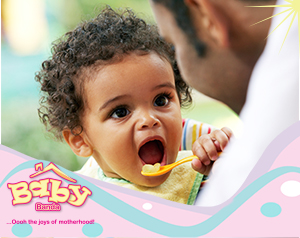A food allergy is a reaction to the protein in food. When introducing a new food, it is important to look for signs of an allergy. Signs of an allergy can occur within a few minutes or a number of days after eating a certain food. Signs of a severe anaphylactic reaction may include hives, swelling, difficulty swallowing or breathing, skin colour changes and dizziness/fainting. A baby may also pull or scratch at her tongue and talk or cry with a hoarser or squeakier voice. Get immediate medical attention if these severe symptoms occur. If a baby experiences any of these symptoms or any other reaction while eating food, stop feeding them food you think caused the allergy until you can talk to your baby’s doctor or health care provider.
Stop feeding food if you think it is causing:
• Swelling of the face, tongue, lips, eyes, and throat.
• Rash, itchiness, hives that are spreading.
• Vomiting, stomach cramps, diarrhoea.
• Problems with breathing, swallowing, wheezing, coughing, choking, voice changes.
• Sneezing, runny nose, blocked nose.
• Itchy, watery eyes.
Caution – Choking
• Babies can choke or suffocate easily since they do not have the teeth and chewing abilities of an older child or adult.
• Babies should eat sitting upright with an adult present. Babies should never eat while alone or while moving around.
• Certain foods can be a choking hazard for children before they reach four years of age. Choking hazards include foods that are:
• Hard (such as nuts, seeds and raw carrot pieces).
• Hard to chew (such as corn, shellfish, popcorn, candy, raisins and other dried fruits).
Avoid these foods that can cause CHOKING
• raisins, gum, candies, popcorn, nuts and seeds
• fish with bones
• snacks using toothpicks or skewers
These foods are safer for infants and young children when they are prepared as described
• Hard vegetables or fruit – grate carrots, remove pits in fruit, cut grapes in quarters lengthwise with seeds removed, and soften raw vegetables by cooking so that they are easier to chew.
• Peanut butter and melted cheese as given alone (i.e. from a spoon) are hard to swallow and could get stuck in the throat and block airflow. To make these foods safer for young children, spread thinly on bread.
• Foods which can be hard to chew – cut these foods into baby bite-sized pieces.













